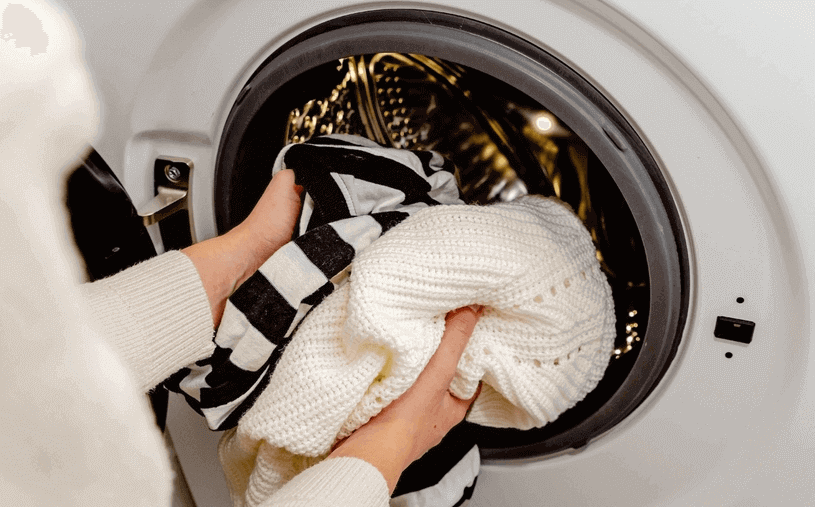KEY POINTS
- On average, using your washing machine adds $31 to $96 to your electricity bill per year.
- Washing machine running costs will vary depending on the type of machine, its capacity and efficiency, cycle settings and even your geographical location.
- You can reduce long-term costs by buying a more energy efficient washing machine, using a cold wash when possible, picking a machine best suited to your load size and switching to a better-priced electricity plan.
In this Canstar Blue cost analysis, we look at how much it costs to run your home washing machine. We look at the electricity costs by state, model, energy efficiency rating and size capacity.
The upfront purchase price is always a factor when buying a new washing machine, but have you considered the ongoing costs? It’s easy to overlook, but your washing machine is a significant contributor to your utility bills. This means the wrong washing machine could cost you big time in the long run.
So how much does your washing machine cost to use and would you be better off buying a more efficient model? Canstar Blue explores how much electricity a washing machine uses, as well as ways you can potentially save on running costs.
On this page:
How much does it cost to run a washing machine?
Depending on the type, capacity, efficiency and cycle setting of your washing machine, as well as your geographical location, it can cost anywhere from $31 to $96 a year in energy costs to run your home washing machine, according to Canstar Blue data. This estimation assumes a household is running three loads a week with a warm wash, in a 5kg-10kg unit.
For a full cost analysis by state or territory, we have included the annual costs for front loaders and top loaders in each area below. This guide should be treated as general only. Running costs for your home washing machine may fluctuate depending on your personal circumstances.
Average annual washing machine running costs by city
← Mobile/tablet users, scroll sideways to view full table →
| City | Top Loader | Front Loader | Difference |
|---|---|---|---|
| Sydney | $74.78 | $42.96 | -$31.52 |
| Melbourne | $54.27 | $31.30 | -$22.97 |
| Brisbane | $71.19 | $41.06 | -$30.13 |
| Adelaide | $96.89 | $55.89 | -$41.00 |
| Perth | $69.39 | $40.03 | -$29.36 |
| Hobart | $60.86 | $35.10 | -$25.76 |
| Darwin | $64.17 | $37.02 | -$27.15 |
Source: www.canstarblue.com.au – 16/04/2025. Average energy consumption figures based on clothes washers listed in the Commonwealth of Australia E3 Program’s Registration database, which assumes 7 uses per week using a warm wash (calculations adjusted to 3 uses per week). Electricity usage cost estimates based on average electricity usage rates: 33.9 c/kWh in Sydney, 24.7 c/kWh in Melbourne, 32.4 c/kWh in Brisbane, 44.1 c/kWh in Adelaide, 31.6 c/kWh in Perth, 27.7 c/kWh in Hobart, 29.2 c/kWh in Darwin, 29.7 c/kWh in Canberra. Average electricity usage rates are based on single-rate, non-solar only plans on Canstar’s database, available for an annual usage of 4,373 kWh with the exception of Perth which is based on the Synergy Home Plan (A1) tariff and Darwin which is based on the government regulated rate.
From the data, we can see that households in Adelaide appear to have the highest washing machine running costs, while Melbourne has the cheapest prices.
Got a washer and dryer combo? See how much your dryer could be leaving you out of pocket with Canstar Blue’s dryer running cost analysis.
Is it cheaper to use an energy efficient washing machine?
Energy efficient washing machines will almost always have lower running costs than their inefficient counterparts, however they’re also usually more expensive to purchase in the first place.
For an example of what you could expect to save by making the switch to a more energy efficient washing machine, we’ve calculated the average annual running cost of various energy rated units. Please note, these calculations are based on a front loader which has been used for three warm wash loads per week.
Advertisement
Average annual washing machine running costs by energy efficiency rating
← Mobile/tablet users, scroll sideways to view full table →
| Star Rating | Usage | Cost |
|---|---|---|
| 1 to 2 Stars | 237kW | $76 |
| 2.5 to 3.5 Stars | 181kW | $58 |
| 4 to 4.5 Stars | 123kW | $39 |
| 5 to 5.5 Stars | 95kW | $30 |
Source: www.canstarblue.com.au – 16/04/2025. Average energy consumption figures based on clothes washers listed in the Commonwealth of Australia E3 Program’s Registration database, which assumes 7 uses per week using a warm wash (calculations adjusted to 3 uses per week).. Electricity usage cost estimates based on the average electricity usage rate of 32.1 c/kWh. Average electricity usage rates are based on single-rate, non-solar only plans on Canstar’s database, available for an annual usage of 4,373 kWh.
From the data above, we can see that users could make a saving of about $46 per year by upgrading from a one or two-star rated washing machine, to a five or 5.5-star model. Of course, the savings could be even greater depending on your location, usage, model type and wash settings. It may pay to investigate your options next time you’re in the market for a new washer.
How much electricity does a washing machine use?
How much electricity a washing machine uses will vary depending on the energy efficiency rating and the capacity of your washer. Typically, the higher the energy rating and machine’s load capacity, the more electricity it will use.
Average annual clothes washer running costs by capacity
← Mobile/tablet users, scroll sideways to view full table →
| Capacity | Usage | Cost |
|---|---|---|
| 5 to 10kg | 127kW | $41 |
| >10kg | 165W | $53 |
Source: www.canstarblue.com.au – 16/04/2025. Average energy consumption figures based on clothes washers listed in the Commonwealth of Australia E3 Program’s Registration database, which assumes 7 uses per week using a warm wash (calculations adjusted to 3 uses per week). Electricity usage cost estimates based on the average electricity usage rate of 32.1 c/kWh. Average electricity usage rates are based on single-rate, non-solar only plans on Canstar’s database, available for an annual usage of 4,373 kWh.
We can see from the data that if you have a washer with a capacity of more than 10kg, the energy usage will be almost 40kW higher and $12 more expensive to run than a 5 to 10kg model. By opting for a lower capacity washer you could save some money on your energy bill, but this will depend on how often you use your machine and how many loads you need to get the washing done.
Paying too much for power? Compare cheap electricity plans below
Picking an energy efficient washing machine for your home can only get you so far if you find you’re still on a dud energy plan. Below are some of the cheapest plans in New South Wales, Victoria, south-east Queensland and South Australia according to our database. Are you missing out on additional savings?
Here are some of the cheapest published deals from the retailers on our database that include a link to the retailer’s website for further details. These are products from referral partners†. These costs are based on the Ausgrid network in Sydney but prices may vary depending on your circumstances. This comparison assumes general energy usage of 3900kWh/year for a residential customer on a single rate tariff. Please use our comparison tool for a specific comparison in your area. Our database may not cover all deals in your area. As always, check all details of any plan directly with the retailer before making a purchase decision.
Here are some of the cheapest published deals from the retailers on our database that include a link to the retailer’s website for further details. These are products from referral partners†. These costs are based on the Citipower network in Melbourne but prices may vary depending on your circumstances. This comparison assumes general energy usage of 4000kWh/year for a residential customer on a single rate tariff. Please use our comparison tool for a specific comparison in your area. Our database may not cover all deals in your area. As always, check all details of any plan directly with the retailer before making a purchase decision.
Here are some of the cheapest published deals from the retailers on our database that include a link to the retailer’s website for further details. These are products from referral partners†. These costs are based on the Energex network in Brisbane but prices may vary depending on your circumstances. This comparison assumes general energy usage of 4600kWh/year for a residential customer on a single rate tariff. Please use our comparison tool for a specific comparison in your area. Our database may not cover all deals in your area. As always, check all details of any plan directly with the retailer before making a purchase decision.
Here are some of the cheapest published deals from the retailers on our database that include a link to the retailer’s website for further details. These are products from referral partners†. These costs are based on the SA Power network in Adelaide but prices may vary depending on your circumstances. This comparison assumes general energy usage of 4000kWh/year for a residential customer on a single rate tariff. Please use our comparison tool for a specific comparison in your area. Our database may not cover all deals in your area. As always, check all details of any plan directly with the retailer before making a purchase decision.
How to reduce washing machine power consumption
Now that you know how much a load of washing costs in Australia, you may be trying to figure out how to make some savings. Here are some simple tips:
- If you’re buying a new washing machine, consider a front loader instead of a top loader. Front loaders use around half the amount of water and electricity. Twin tubs are also said to be efficient depending on what you’re washing.
- Look for models with load sensing technology. The machine will adjust the amount of water it uses according to load size.
- Use cold wash wherever possible. Cold wash is sufficient for lightly soiled clothes and is ideal for brightly coloured clothing. Warm or hot water will be necessary for heavily sullied clothing.
- Consider what size machine will meet your washing needs. The larger the washing machine, the higher the energy and water consumption.
- Ensure you’re getting the best price on electricity. If you haven’t compared your electricity plan recently, you might be spending more than you have to on your washing machine and other electrical appliances.
All this washer talk might have you thinking about purchasing a new model. To help you choose the right appliance for you and your home, check out some of Canstar Blue’s best-rated washing machines.
Original reporting by Jared Mullane
Image Source: Damian Lugowski/Shutterstock




Share this article